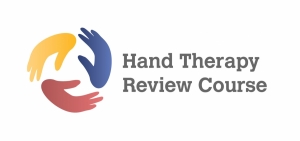Registration is now closed for this course.
Thank-you for your interest.
Day 1: Pre:Course: Foundational Science of the Upper Extremity: An Anatomy and Kinesiology Review
Days 2 and 3: Comprehensive Survey of Hand Therapy Review Course
Day 1 Description
Friday, June 22 (Pre-course)
Foundational Science of the Upper Extremity: An Anatomy and Kinesiology Review
A working knowledge of the anatomy and kinesiology of the upper extremity provides a solid foundation for therapeutic evaluation and intervention. Using classroom-lecture style, this pre-course will review the anatomy and biomechanics of each joint and examine the brachial plexus and innervation patterns of the arm and hand.
Day 1 Objectives
At the conclusion of this activity, participants will be able to:
- Identify three areas of personal weakness in the practice of hand therapy, in order to create a personal learning plan to remediate areas of the clinician's own limited understanding. The learning plan is to be implemented by each attendee to strengthen clinical skill in hand therapy.
- Explain interaction between boney anatomy, static and dynamic stabilizers, and proprioceptive reflexes necessary to allow pain free range of motion and force transmission across the following joints: digits, thumb, wrist, elbow, and shoulder.
Days 2 and 3 Description
Saturday, June 23 and Sunday, June 24
Comprehensive Survey of Hand Therapy Review Course Description
This course is designed to provide a comprehensive review of the evaluation and intervention processes pursued for typical diagnoses in upper extremity rehabilitation. Advanced clinicians will describe fundamental concepts, clinical reasoning, and evidence to provide a multi-faceted approach to the hand therapy process. Adjunctive methods for intervention will be analyzed as a means to facilitate outcomes, and expert panels will be offered throughout the weekend to allow a high level of attendee-faculty interaction via discussion panels.
Days 2 and 3 Objectives
At the conclusion of this activity, participants will be able to:
- Design and implement a treatment plan for patients with common upper extremity diagnoses, including: cubital tunnel syndrome; carpal tunnel syndrome; adhesions or tightness (e.g. musculotendinis, capsular); digit amputations; hand arthritis and rheumatic diseases; crush injuries/multilating trauma of the hand); disclocations and subluxations of the shoulder and elbow; Dupuytren’s disease; upper extremity fractures of the finger, hand, wrist, forearm and upper arm; wrist, elbow or shoulder ligamentous injury and instability.
- Describe three priorities to consider when formulating a treatment plan for a patient with a digital level replant at the proximal phalanx.
- Justify clinical application of three separate physical agents given a patient with edema, pain and sensory disturbance.
- Determine how to modify hand therapy protocols according to patient-specific variables for patients with the following conditions: hand fractures (phalangeal, metacarpal) and wrist fractures (carpal or distal radius); tendon injuries (flexor or extensor injuries) for patients who have complications due to flexor or extensor tendon adherence.
- Discuss three discrete patterns of wrist instability given a patient history, symptoms and results of diagnostic testing and clinical special testing.
- Propose a treatment plan including orthosis and safe exercise progression given a patient with triangular fibrocartilage complex injuries and ulnar wrist pain.
- Design a custom program considering post-operative limitations for each patient after arthroplasties, including one each of the following procedures: shoulder reverse or traditional arthroplasty, elbow total arthroplasty, wrist total arthroplasty, thumb carpometacarpophalangeal interposition arthroplasty and index, middle, ring, and small digits metacarpophalangeal and proximal interphalangeal arthroplasty.
-
Identify two appropriate rehabilitation goals and three interventions to promote post-operative healing and recovery of function in the spectrum of three conditions of rotator cuff injury (tendinitis, tendinosis, and rotator cuff tear), and two instability conditions of the shoulder (traumatic unidirectional and atraumatic multidirectional).
REGISTRATION FEES
Registration is on a first come first served basis. Limited enrollment is planned to ensure quality of course and ample instructor-participant attention. Cancellation of registration up to two weeks prior to course date will result in a refund minus a $50 cancellation fee. THERE WILL BE NO REFUNDS AFTER THIS ESTABLISHED DEADLINE. It is the responsibility of the registrant to notify ASHT of cancellation in writing or by email to education@asht.org. Refunds will be issued within 30 days of notification. In the unlikely event that a course is canceled, ASHT will provide full refund of the registration fee only.
All grievances may be directed to the ASHT Education Division by sending an email to:
education@asht.org.
Three Days: Friday, Saturday and Sunday
Members: $450
Non-Members $560
Education Plus Associate: 3-Day Registration Plus New ASHT Associate Membership (for Non-Members) $735 *
Education Plus Affiliate: 3-Day Registration Plus New ASHT Affiliate Membership (for Non-Members) $735 *
* Education Plus combines new Associate or Affiliate Membership dues and HTRC 3-day registration into one payment. Membership will be valid thru 12/31/18.
* Education Plus is solely for non-members who would like to join ASHT; it is not for existing members who would like to renew their membership.
For further information about Associate of Affiliate Membership, please visit Membership Categories.
Two Days: Saturday and Sunday
Members $380
Non-Members $475
CLICK HERE for the course program
CLICK HERE for registration fees
CLICK HERE for course location information (including directions and parking)
CLICK HERE for hotel accommodations information
CLICK HERE for course accreditation information
CLICK HERE for faculty profiles
For further information or questions regarding this course, contact education@asht.org or call 856-380-6862.
Read More About DeKalb Medical - Occupational and Physical Therapy


